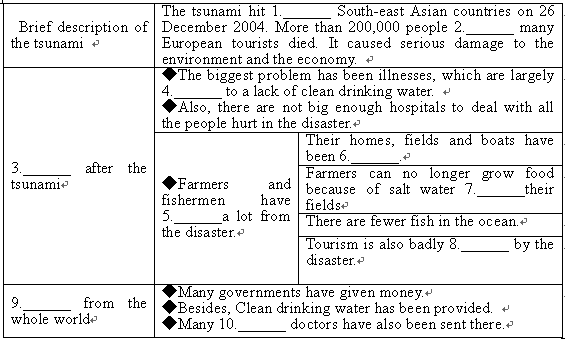题目内容
They cannot vote which nations should have a seat on the United Nations Security Council (安理会), but ordinary people have shown their feelings.
By Tuesday afternoon, over 11.5 million people in and outside China had signed an on line petition (请愿) saying Japan should not succeed in its bid (申请)for an everlasting seat on the Security Council.
The loud call is due to the historical facts in World War II.Some Japanese politicians said their country is ready to play a more active role in global affairs, and their country's contribution can no longer be limited to financial aspects.
The petition by 11.5 million people tells Japan that money alone cannot buy their hearts.
A new history textbook that a right-wing Japanese organization has submitted (递交) for official agreement goes so far as to paint Japan as a "victim"(牺牲者)in World War II .Its authors even say that China started all the wars between the two countries.
Japanese Prime Minister Junichiro Koizumi turned down an invitation to a grand party in Moscow on May 9 to celebrate the 60th anniversary of the end of War World II.Koizumi's absence will do nothing but encourage more probes (追究) into his country's historical baggage.
Japanese politicians continue to visit the Yasukuni Shrine (神社).Wartime leader and war criminal Hideki Tojo, as well as five other hanged war criminals, are buried at the shrine.They talk about peace during the visits and ask their Asian neighbors to understand Japanese culture, which requires them to visit Shinto shrines to mark seasonal celebrations.But they don't see the pains that the Japanese invasion(侵略)brought on other Asian countries.How can a nation sleep with such a history on its conscience (良心)?The amount of money Japan gives the United Nations does not necessarily give the country the role in international affairs.Neither will an everlasting seat on the Security Council free Japan from its historical baggage.
1.According to some Japanese politicians their visits to Shints Shrines are due to .
A.the fact that the six World War II criminals were buried there
B.the intention that Japan wants to get an everlasting seat on the Security Council
C.the requirement of Japanese culture
D.the probes of the war criminals
2.The 11.5 million people signed an online petition to ____.
A.stop Japan from bidding an everlasting seat on the Security Council
B.express their feelings that they didn't want Japan to win its bid
C.honor the people who died in World War II
D.support idea that Japan should give the UN more money.
3.In a new Japanese history book ____.
A.the Japanese are described as right-wing people
B.many victims submitted the agreement in World War II
C.Japanese government has signed the agreement officially
D.China is considered to have been responsible for the war
4.Which of the following descriptions about Japan is NOT true?
A.The government refused an invitation to the 60th anniversary of the end of World war II.
B.It wants to get an everlasting seat on the Security Council.
C.It wants more probes into its historical baggage.
D.It gives the UN much money.
CBDC

 天天向上一本好卷系列答案
天天向上一本好卷系列答案 小学生10分钟应用题系列答案
小学生10分钟应用题系列答案